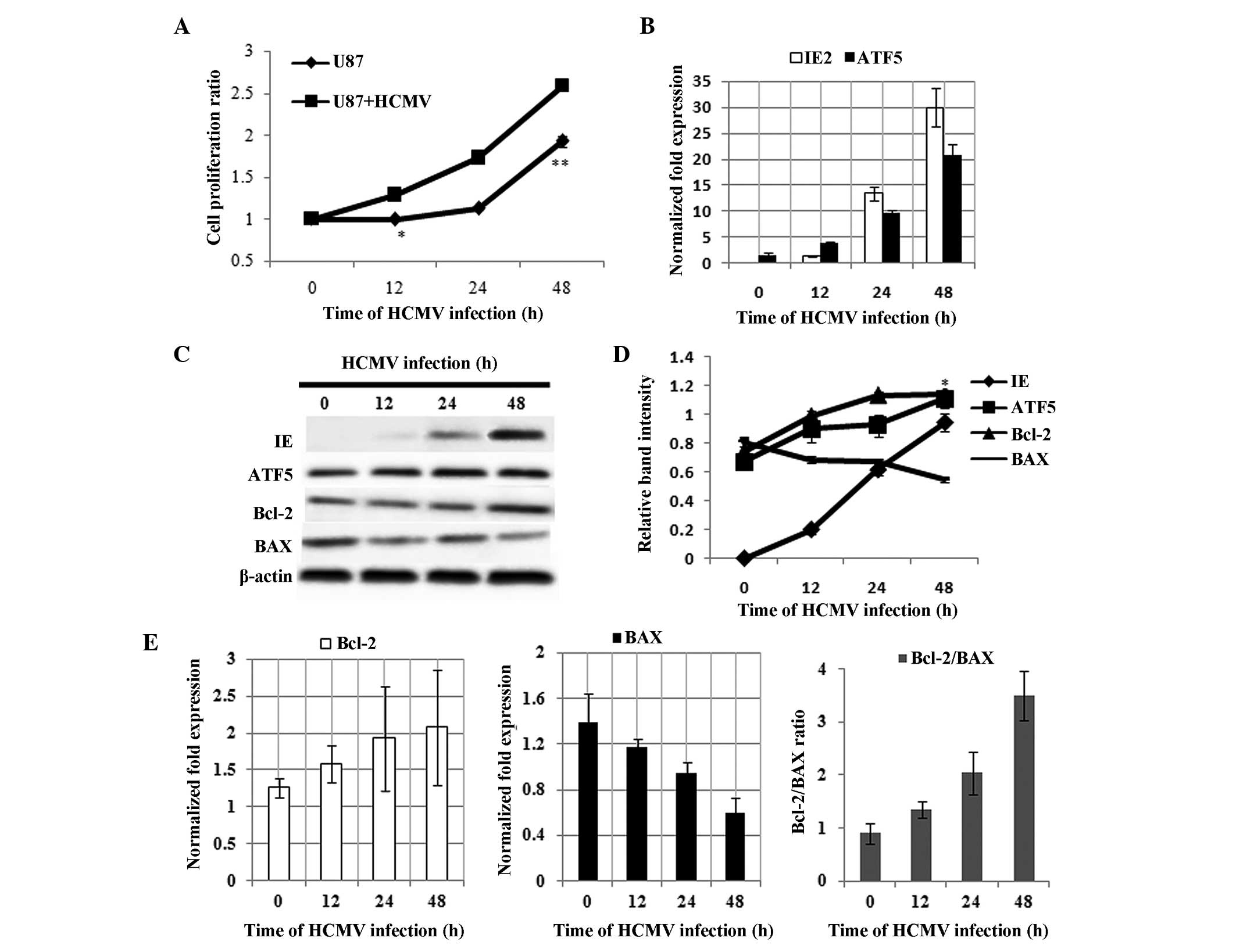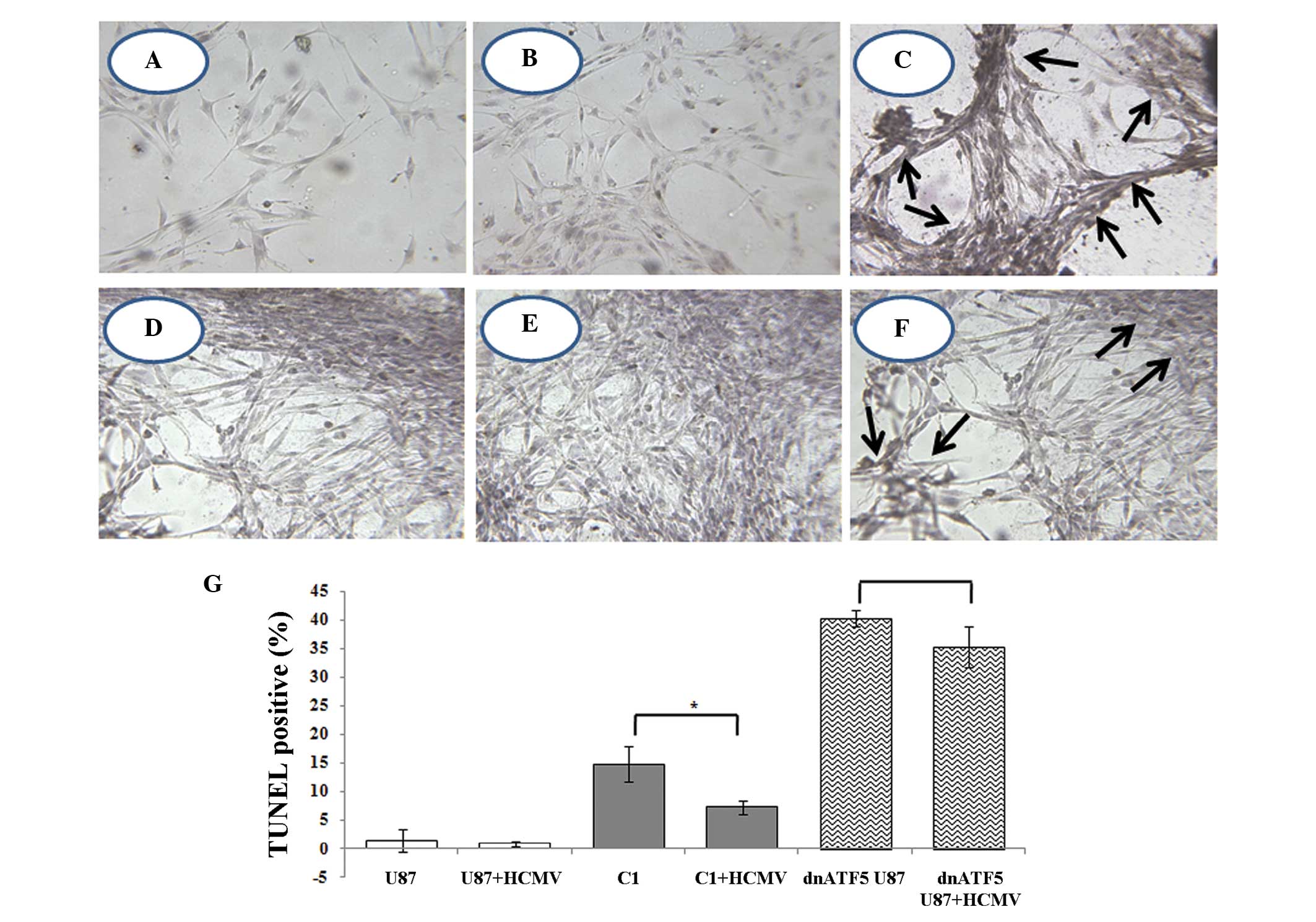|
1
|
Arias A, Lamé MW, Santarelli L, Hen R,
Greene LA and Angelastro JM: Regulated ATF5 loss-of-function in
adult mice blocks formation and causes regression/eradication of
gliomas. Oncogene. 31:739–751. 2012.
|
|
2
|
Stupp R, Mason WP, van den Bent MJ, et al:
European Organisation for Research and Treatment of Cancer Brain
Tumor and Radiotherapy Groups; National Cancer Institute of Canada
Clinical Trials Group: Radiotherapy plus concomitant and adjuvant
temozolomide for glioblastoma. N Engl J Med. 352:987–996. 2005.
|
|
3
|
Vescovi AL, Galli R and Reynolds BA: Brain
tumour stem cells. Nat Rev Cancer. 6:425–436. 2006.
|
|
4
|
Michaelis M, Doerr HW and Cinatl J: The
story of human cytomegalovirus and cancer: increasing evidence and
open questions. Neoplasia. 11:1–9. 2009.
|
|
5
|
Sheng Z, Li L, Zhu LJ, et al: A
genome-wide RNA interference screen reveals an essential
CREB3L2-ATF5-MCL1 survival pathway in malignant glioma with
therapeutic implications. Nat Med. 16:671–677. 2010.
|
|
6
|
Persengiev SP and Green MR: The role of
ATF/CREB family members in cell growth, survival and apoptosis.
Apoptosis. 8:225–228. 2003.
|
|
7
|
Watatani Y, Ichikawa K, Nakanishi N, et
al: Stress-induced translation of ATF5 mRNA is regulated by the
5′-untranslated region. J Biol Chem. 283:2543–2553. 2008.
|
|
8
|
Angelastro JM, Ignatova TN, Kukekov VG, et
al: Regulated expression of ATF5 is required for the progression of
neural progenitor cells to neurons. J Neurosci. 23:4590–4600.
2003.
|
|
9
|
Persengiev SP, Devireddy LR and Green MR:
Inhibition of apoptosis by ATFx: a novel role for a member of the
ATF/CREB family of mammalian bZIP transcription factors. Genes Dev.
16:1806–1814. 2002.
|
|
10
|
Angelastro JM, Canoll PD, Kuo J, et al:
Selective destruction of glioblastoma cells by interference with
the activity or expression of ATF5. Oncogene. 25:907–916. 2006.
|
|
11
|
Monaco SE, Angelastro JM, Szabolcs M and
Greene LA: The transcription factor ATF5 is widely expressed in
carcinomas, and interference with its function selectively kills
neoplastic, but not nontransformed, breast cell lines. Int J
Cancer. 120:1883–1890. 2007.
|
|
12
|
Dluzen D, Li G, Tacelosky D, Moreau M and
Liu DX: BCL-2 is a downstream target of ATF5 that mediates the
prosurvival function of ATF5 in a cell type-dependent manner. J
Biol Chem. 286:7705–7713. 2011.
|
|
13
|
Chipuk JE, Moldoveanu T, Llambi F, Parsons
MJ and Green DR: The BCL-2 family reunion. Mol Cell. 37:299–310.
2010.
|
|
14
|
Harris MH and Thompson CB: The role of the
Bcl-2 family in the regulation of outer mitochondrial membrane
permeability. Cell Death Differ. 7:1182–1191. 2000.
|
|
15
|
Cobbs CS, Soroceanu L, Denham S, Zhang W
and Kraus MH: Modulation of oncogenic phenotype in human glioma
cells by cytomegalovirus IE1-mediated mitogenicity. Cancer Res.
68:724–730. 2008.
|
|
16
|
Barami K: Oncomodulatory mechanisms of
human cytomegalovirus in gliomas. J Clin Neurosci. 17:819–823.
2010.
|
|
17
|
Michaelis M, Kotchetkov R, Vogel JU, Doerr
HW and Cinatl J Jr: Cytomegalovirus infection blocks apoptosis in
cancer cells. Cell Mol Life Sci. 61:1307–1316. 2004.
|
|
18
|
Ranganathan P, Clark PA, Kuo JS, Salamat
MS and Kalejta RF: Significant association of multiple human
cytomegalovirus genomic Loci with glioblastoma multiforme samples.
J Virol. 86:854–864. 2012.
|
|
19
|
Xuan B, Qian Z, Torigoi E and Yu D: Human
cytomegalovirus protein pUL38 induces ATF4 expression, inhibits
persistent JNK phosphorylation, and suppresses endoplasmic
reticulum stress-induced cell death. J Virol. 83:3463–3474.
2009.
|
|
20
|
Benedict CA, Norris PS and Ware CF: To
kill or be killed: viral evasion of apoptosis. Nat Immunol.
3:1013–1018. 2002.
|
|
21
|
Poland SD, Costello P, Dekaban GA and Rice
GP: Cytomegalovirus in the brain: in vitro infection of human
brain-derived cells. J Infect Dis. 162:1252–1262. 1990.
|
|
22
|
Ogura T, Tanaka J, Kamiya S, Sato H, Ogura
H and Hatano M: Human cytomegalovirus persistent infection in a
human central nervous system cell line: production of a variant
virus with different growth characteristics. J Gen Virol.
67:2605–2616. 1986.
|
|
23
|
Cobbs CS, Harkins L, Samanta M, et al:
Human cytomegalovirus infection and expression in human malignant
glioma. Cancer Res. 62:3347–3350. 2002.
|
|
24
|
Sadanari H, Yamada R, Ohnishi K, Matsubara
K and Tanaka J: SUMO-1 modification of the major immediate-early
(IE) 1 and 2 proteins of human cytomegalovirus is regulated by
different mechanisms and modulates the intracellular localization
of the IE1, but not IE2, protein. Arch Virol. 150:1763–1782.
2005.
|
|
25
|
Zhu H, Shen Y and Shenk T: Human
cytomegalovirus IE1 and IE2 proteins block apoptosis. J Virol.
69:7960–7970. 1995.
|
|
26
|
Schwartz R, Helmich B and Spector DH: CREB
and CREB-binding proteins play an important role in the IE2
86-kilodalton protein-mediated transactivation of the human
cytomegalovirus 2.2-kilobase RNA promoter. J Virol. 70:6955–6966.
1996.
|
|
27
|
Pu P, Kang C, Zhang Z, Liu X and Jiang H:
Downregulation of PIK3CB by siRNA suppresses malignant glioma cell
growth in vitro and in vivo. Technol Cancer Res Treat. 5:271–280.
2006.
|
|
28
|
Teng MW, Bolovan-Fritts C, Dar RD, et al:
An endogenous accelerator for viral gene expression confers a
fitness advantage. Cell. 151:1569–1580. 2012.
|
|
29
|
Bai Z, Li L, Wang B, et al: Effect of
inducible expressed human cytomegalovirus immediate early 86
protein on cell apoptosis. Biosci Biotechnol Biochem. 73:1268–1273.
2009.
|
|
30
|
Hu M, Wang B, Qian D, et al: Interference
with ATF5 function enhances the sensitivity of human pancreatic
cancer cells to paclitaxel-induced apoptosis. Anticancer Res.
32:4385–4394. 2012.
|
|
31
|
Chen A, Qian D, Wang B, et al: ATF5 is
overexpressed in epithelial ovarian carcinomas and interference
with its function increases apoptosis through the downregulation of
Bcl-2 in SKOV-3 cells. Int J Gynecol Pathol. 31:532–537. 2012.
|
|
32
|
Augelastro JM, Canoll PD, Kuo J, et al:
Selective destruction of glioblastoma cells by interference with
the activityor expression of ATF5. Oncogene. 25:907–916. 2006.
|


















